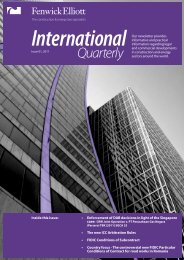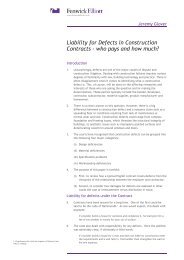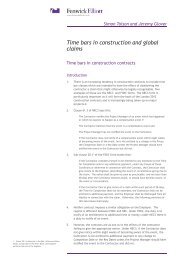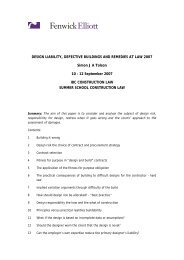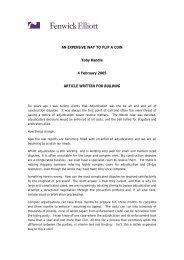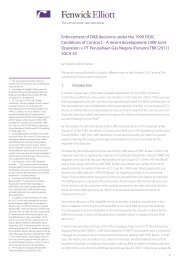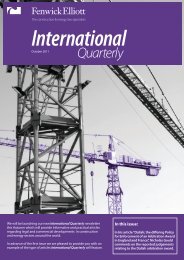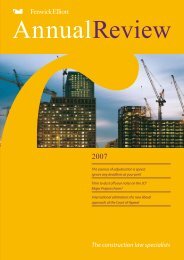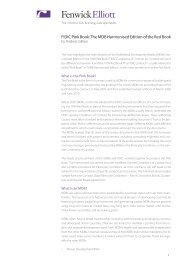CRW Joint Operation v. PT Perusahaan Gas Negara - Fenwick Elliott
CRW Joint Operation v. PT Perusahaan Gas Negara - Fenwick Elliott
CRW Joint Operation v. PT Perusahaan Gas Negara - Fenwick Elliott
Create successful ePaper yourself
Turn your PDF publications into a flip-book with our unique Google optimized e-Paper software.
Insight: Romania<br />
International focus on countries and sectors Issue 01 Winter 2011<br />
The controversial<br />
new FIDIC Particular<br />
Conditions of<br />
Contract for road<br />
works in Romania<br />
By Frederic Gillion<br />
Partner, <strong>Fenwick</strong> <strong>Elliott</strong><br />
In March 2011, the Romanian government<br />
introduced new FIDIC conditions of contract<br />
applicable to road works, officially to<br />
address inconsistencies between the FIDIC<br />
forms of contract and Romanian legislation.<br />
Those new conditions of contract have<br />
quickly caused much controversy among<br />
those contractors which are tendering for<br />
road works in Romania and were even the<br />
subject of a joint statement issued by the<br />
European Construction Industry Federation<br />
(FIEC) and the European International<br />
Contractors (EIC) and addressed to the<br />
European Commission in May 2011.<br />
Making standard and compulsory particular<br />
conditions of contract so as to meet local<br />
requirements and regulations is fairly<br />
common and obviously totally acceptable.<br />
However what is questionable is the<br />
attempt of the Romanian government to<br />
change the allocation of risks in the process.<br />
The change in the allocation of risks has<br />
been particularly significant with the<br />
Yellow Book as the new conditions of<br />
contract have literally imported entire<br />
provisions from the Silver Book (applicable<br />
to turnkey projects) when FIDIC itself<br />
recognizes that this form is not a balanced<br />
form of contract and that it should not be<br />
used “if construction will involve substantial<br />
underground work”. Having Silver Book<br />
provisions relating to the Contractor’s<br />
responsibility for unforeseen events and<br />
the Employer’s Requirements applied to<br />
road projects is clearly worrying.<br />
A quick review of some of the changes<br />
introduced by those new conditions<br />
of contract is sufficient to explain why<br />
international contractors are becoming<br />
increasingly cautious about the new<br />
invitations to tender launched this year<br />
under these new conditions of contract. In<br />
a nutshell: additional risks have been shifted<br />
to the Contractor and the Contractor’s<br />
entitlement to claim under the Contract<br />
has been significantly restricted.<br />
Contractor’s • right of access to the Site<br />
(Sub-Clause 2.1) - The Contractor waives<br />
any right to claim in respect of the handing<br />
over of the Site in sections irrespective of<br />
the size of those sections, their location<br />
or the additional costs associated with a<br />
completion of the Works in sections.<br />
Unforeseeable Physical Conditions (Sub-<br />
Clause 4.12) – Here the provisions of Sub-<br />
Clause 4.12 of the Silver Book [Unforeseen<br />
Difficulties] have been introduced, which<br />
means that the Contractor is deemed to<br />
have obtained all necessary information<br />
as to risks, contingencies and other<br />
circumstances which may influence or<br />
affect the Works. Unquantifiable risks<br />
such as risks for ground conditions, fossils,<br />
archaeological findings have now been<br />
transferred to the Contractor.<br />
Responsibility for the accuracy of the<br />
Employer’s Requirements (Sub-Clause<br />
5.1 of the Yellow Book) – In the same vein,<br />
by adopting more or less the provisions<br />
of Sub-Clause 5.1 of the Silver Book, the<br />
Contractor is now responsible for the<br />
accuracy of the Employer’s Requirements.<br />
Delay damages – Delay damages can<br />
now be levied in the event that specific<br />
milestones are not met. However, if the<br />
final milestone is eventually met, those



